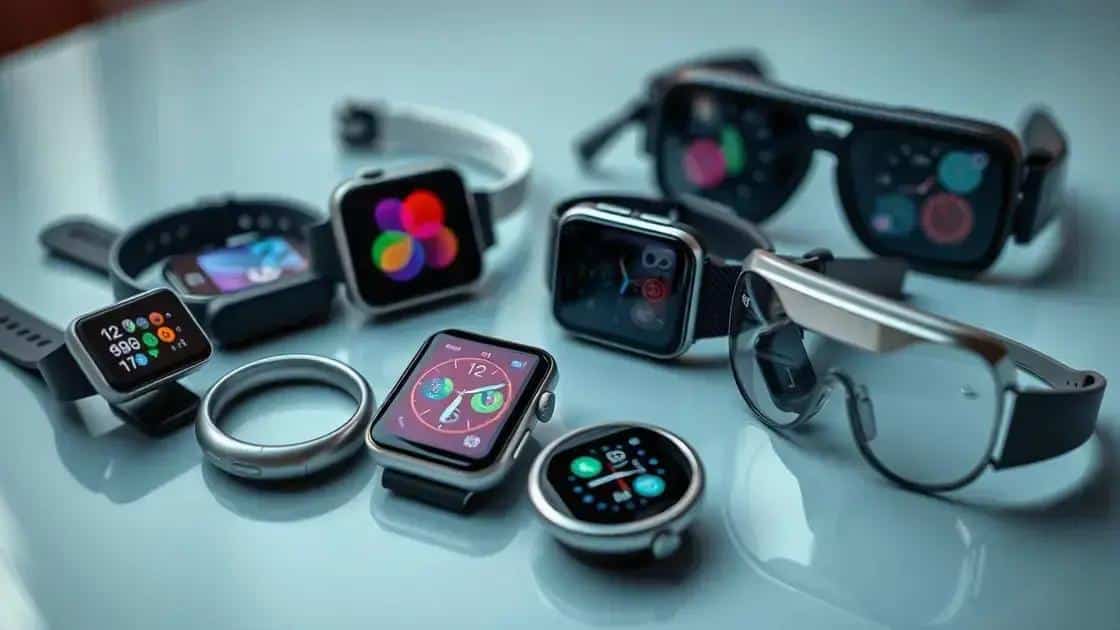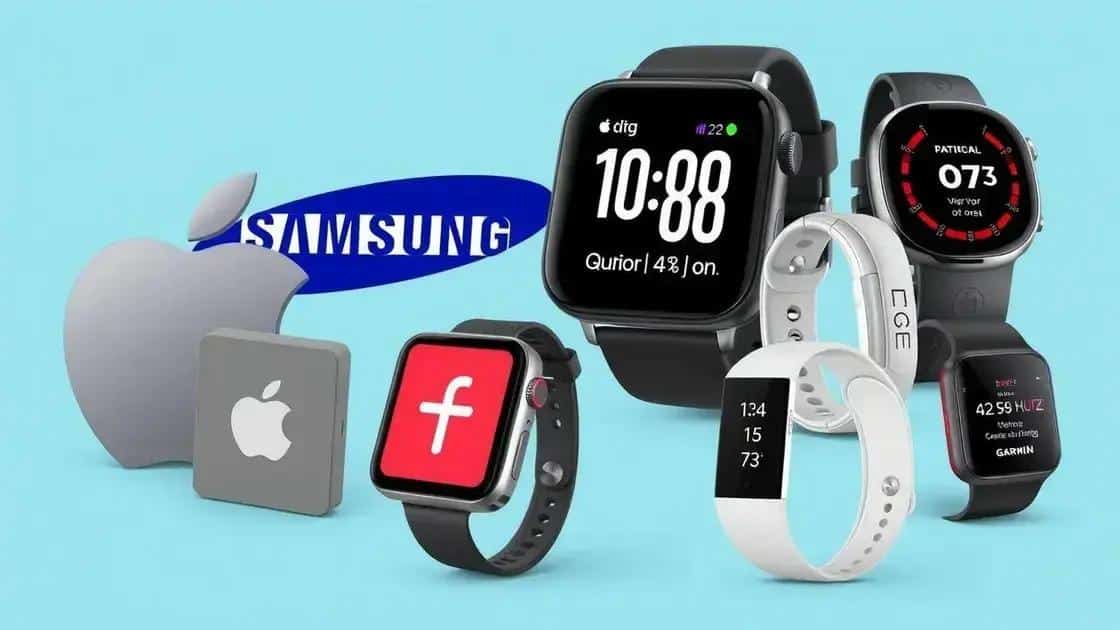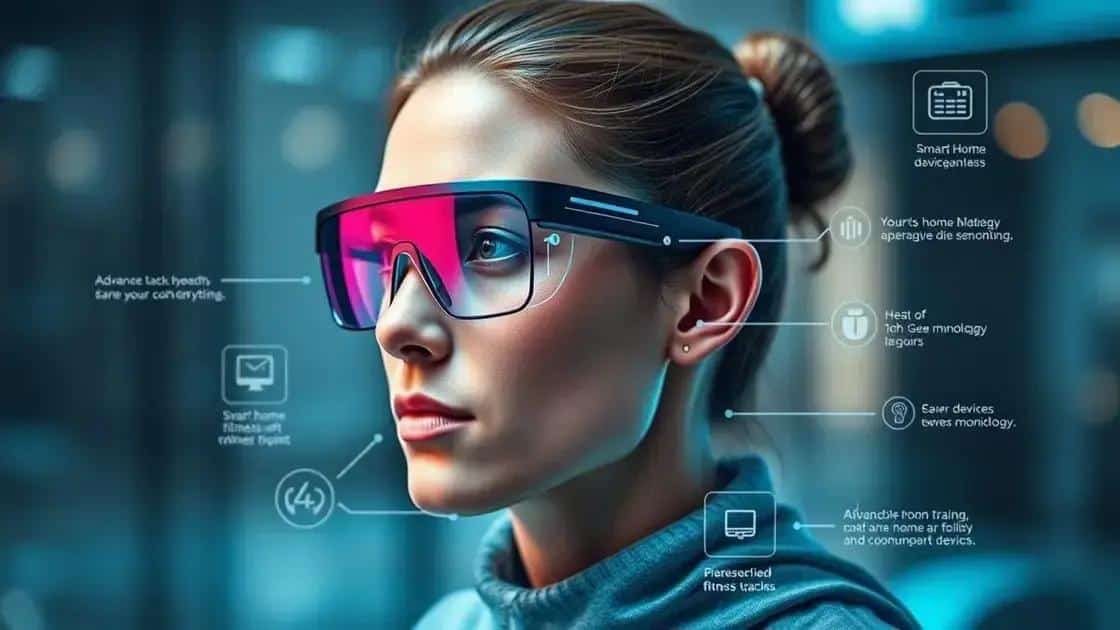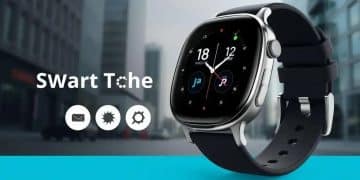Insights on wearable tech innovation: what’s next?

Insights on wearable tech innovation highlight advancements in health monitoring, smart home integration, and personalized user experiences, driving the future of health management and connectivity.
Insights on wearable tech innovation are shaping the way we interact with technology daily. Have you ever wondered how these devices can transform our lifestyles? Let’s dive into the exciting developments.
The evolution of wearable technology
The evolution of wearable technology has been remarkable over the past few decades. From early innovations like the digital watch to today’s sophisticated smart devices, wearables have transformed how we monitor our health and stay connected.
Initially, wearable tech was primarily focused on niche markets. However, it has rapidly grown mainstream due to advances in sensors and connectivity. Today, wearables not only track fitness levels but also help manage daily tasks and enhance communication.
Key Milestones in Wearable Technology
Several milestones have marked the evolution of this technology:
- 1990s: The introduction of simple fitness trackers.
- 2000s: The rise of smartwatches with additional features.
- 2010s: The emergence of health-focused wearables like fitness bands.
- 2020s: Integration of advanced health monitoring tools, including heart rate and blood oxygen data.
The future of wearable technology is even more promising, with innovations like augmented reality (AR) glasses and smart clothing on the horizon. These advancements will likely change how we perceive personal health and connectivity.
Wearable devices are shifting from simple tracking tools to sophisticated systems that offer real-time health data. This evolution is making health management easier and more accessible for everyone. Imagine wearing a device that can help detect health issues before they escalate.
As we look ahead, it’s clear that the journey of wearable technology is just beginning. The progression from basic functionality to highly advanced systems is paving the way for a healthier, more connected future.
Key players in the wearable tech market

Understanding the key players in the wearable tech market is essential to grasp how this industry is evolving. Various companies contribute to incredible advancements in technology and design. Some of these brands have changed how we view fitness and health.
The market is primarily dominated by technology giants. Companies like Apple and Samsung lead the charge with innovative devices that track health metrics and enhance daily activities. These brands focus on user experience and seamless integration with other devices.
Major Companies in Wearable Technology
- Apple: Known for the Apple Watch, they prioritize health features like heart monitoring.
- Samsung: Their Galaxy Watch integrates fitness tracking and smartphone functionality.
- Fitbit: A pioneer in fitness trackers, they focus on simple user interfaces and robust health features.
- Garmin: Popular among athletes, Garmin offers devices that emphasize performance metrics.
Alongside these top brands, several startups are making their mark by focusing on niche markets. For example, companies like Oura produce smart rings that track sleep and readiness, while Biostrap emphasizes precise health monitoring through advanced sensors. These players highlight the diversity and innovation within the market.
Even fashion brands are entering the wearable space, merging style with function. Brands like Fossil and Gucci now offer smartwatches, making technology fashionable. This integration shows how widely accepted wearables have become in our daily lives.
As technology advances, the competition will likely sharpen, leading to even more creative and functional designs. New players might emerge with revolutionary ideas that change fitness and health monitoring. Staying updated on these key market players helps consumers make informed choices when selecting wearables.
Impact of wearable devices on health
The impact of wearable devices on health is profound and growing. These gadgets provide users with real-time data about their physical well-being. With advancements in technology, wearables are becoming essential tools for monitoring health metrics.
Through devices like smartwatches and fitness trackers, users can keep track of their heart rates, sleep patterns, and activity levels. This information helps individuals make informed decisions about their health. For instance, people can adjust their workouts or sleep habits based on the data collected by these devices.
Health Benefits of Wearable Devices
Wearable tech offers several benefits:
- Real-time monitoring: Users can track vital signs instantly.
- Preventive health: Early alerts for potential health issues, such as irregular heartbeats.
- Fitness motivation: Gamification of health goals encourages users to stay active.
- Data collection: Continuous data can be shared with healthcare professionals to improve care.
Moreover, wearables can help in managing chronic conditions. Patients with diabetes, for example, can use sensors to monitor blood glucose levels throughout the day. This allows for better management of their condition and can lead to healthier outcomes.
Wearable devices also promote accountability. With daily reminders and fitness goals, users are more likely to maintain active lifestyles. Whether it’s a friendly competition with friends or personal milestones, technology can encourage people to stay engaged with their health.
As technology continues to advance, the potential for wearables to influence health positively will only expand. Future developments may include even more sophisticated monitoring capabilities and personalized health insights.
Future trends in wearable technology

The future trends in wearable technology are exciting and full of potential. As innovation continues, we can expect smarter devices that cater more directly to individual needs. Wearable technology is evolving to become more integrated into our daily lives.
One key trend is the enhancement of health monitoring capabilities. Future wearables may include sensors that provide even more in-depth health data, such as glucose monitoring for diabetics or advanced ECG readings for heart health. These tools will empower users to take control of their wellness in real-time.
Integration with Smart Home Devices
Another area of growth is the integration of wearables with smart home technology. Imagine your smartwatch controlling your home environment, adjusting lighting or temperature based on your preferences. This type of interaction makes daily tasks more seamless and efficient.
- Smart home connection: Direct connectivity to home devices for enhanced automation.
- Personalized experiences: Custom settings that adapt to user behavior.
- Improved energy management: Devices that manage energy usage based on user activity patterns.
Furthermore, the rise of augmented reality (AR) wearables is on the horizon. AR glasses could provide users with real-time information without needing to check their smartphones. This hands-free operation allows users to stay engaged in their surroundings while accessing needed information.
In addition, developments in battery technology will lead to longer-lasting devices that require less frequent charging. This improvement would enhance user experiences, making wearables more convenient over time.
As artificial intelligence evolves, wearables will become smarter, learning user behavior and preferences. This means devices will not just collect data; they will provide actionable insights tailored to each individual user.
FAQ – Frequently Asked Questions about Wearable Technology
What health benefits do wearable devices offer?
Wearable devices provide real-time health monitoring, helping users track vital signs, activity levels, and sleep patterns.
How can wearables improve my fitness routine?
They can track your workouts, set specific goals, and provide motivation through fitness challenges and reminders.
Will wearable technology integrate with smart home devices?
Yes, future wearables are expected to connect seamlessly with smart home systems, allowing users to control their environment easily.
What are the expected advancements in wearable tech?
Future advancements include better health monitoring, augmented reality features, personalized insights, and improved battery life.






